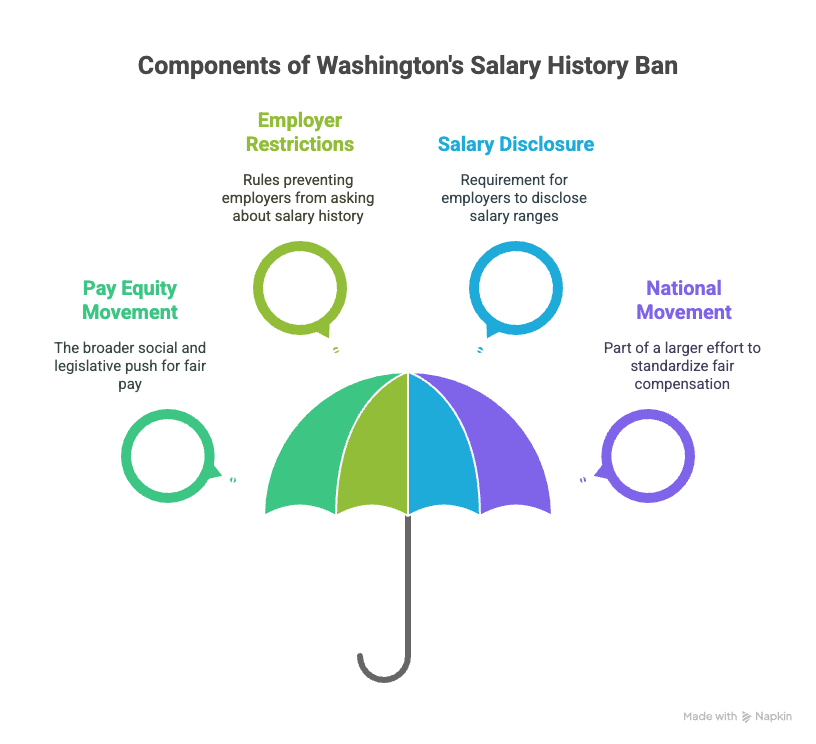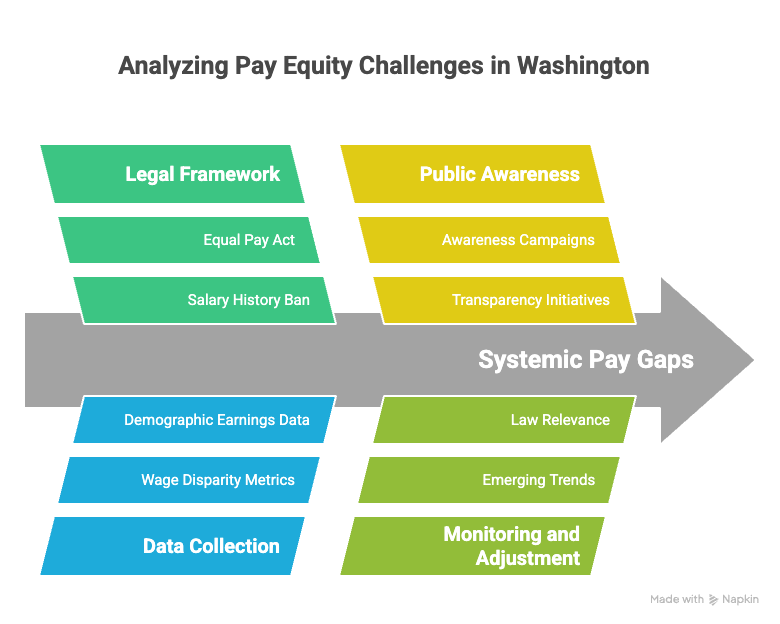In a significant move toward achieving pay equity, Washington State has introduced legislation that prohibits employers from inquiring about a candidate's salary history. This measure is designed to address long-standing wage disparities and ensure fair compensation practices. Whether you're an employer aiming to comply with the new rules or a job seeker curious about your rights, this guide will provide you with a comprehensive understanding of the Washington salary history ban.
Key Takeaways
- Washington's salary history ban aims to reduce workplace pay inequality by preventing employers from asking about a candidate's past wages.
- Employers need to focus on candidates' skills and qualifications rather than previous salaries, requiring changes in hiring practices.
- Job seekers now have more leverage in salary negotiations and can emphasize their skills and market value without past salary constraints.
- The law is part of a broader push for pay equity, connecting with other legal measures to address wage discrimination.
- Adapting to these changes can help employers create fairer workplaces and offer candidates better opportunities based on their current value.
Introduction
Pay inequality remains a significant challenge in the workplace. Salary history questions often perpetuate this problem by anchoring pay on past compensation rather than current skills and qualifications. This practice can unfairly disadvantage individuals, particularly women and minorities, by reinforcing existing wage gaps. Washington State's salary history ban addresses this issue head-on. This legislative move is a proactive effort to ensure fairer pay practices. Understanding the changes gives you insight into how this law shifts not just local but potentially national employment landscapes. Are you ready to navigate the implications of this change?
Understanding the Washington Salary History Ban
Washington's salary history ban stems from a broader movement for pay equity. The law comes into existence after years of social and legislative pressure aimed at closing gender and racial wage gaps. Discussions around this ban emerged as advocates for fair pay highlighted how requesting salary history often perpetuates existing disparities, allowing them to carry forward from job to job.

This law has a few main components. Employers can't ask about or rely on a candidate's previous salary unless disclosed voluntarily. They are also required to disclose the minimum salary for a position upon an applicant's request. For you, as an employer, understanding these rules is crucial. It changes how you approach salary discussions during hiring.
Washington's approach is not a standalone effort. Several other states, like California and New York, have similar laws, each with slight variations, all part of a growing national effort to establish equitable pay standards. This makes Washington part of a larger movement to standardize fair compensation practices. Is your organization ready to adapt to these changes and contribute to a fairer workplace?
Implications for Employers
The Washington salary history ban requires employers to adjust their hiring practices. Adapting to these changes is crucial. Employers must refrain from asking job candidates about their salary history. This means updating HR policies and training staff thoroughly. Ignorance is not an excuse for non-compliance.
Focus on a candidateâs skills and qualifications. Develop interview questions that evaluate experience and capability instead of past salaries. This shift can lead to discovering high-quality talent that might have been overlooked.
Challenges will arise. A common worry is determining a fair starting salary without salary history. Use market research and benchmarking data to establish competitive salary ranges for each position. Set clear criteria for job offers based on role requirements and the candidateâs experience level.
Implementing new systems might also incur additional costs, especially for small businesses. Consider cloud-based recruitment software to streamline processes and ensure compliance with legal requirements. These tools can store job descriptions, candidate evaluations, and market salary data for easy access and consistency in your hiring approach.
Have a dedicated compliance officer if resources allow. This person can oversee adherence to all legal regulations, preventing any mishap. Remember, transparency in your processes is key. Communicate openly with your team about the reasons for these changes and how they align with broader goals.
Fostering an inclusive environment benefits everyone. A fair hiring process helps build a reputation as an employer of choice, attracting a diverse pool of applicants and enhancing workforce morale and productivity. Are you ready to take these steps to ensure fairness and inclusivity in your recruitment process?
Implications for Job Seekers
The Washington salary history ban gives you, the job seeker, more control in salary negotiations. By removing the requirement to disclose past earnings, you can advocate for fair compensation based on your skills and market demand. This law encourages employers to focus on what you can bring to the table rather than what you were previously paid.
When negotiating salaries, emphasize your expertise, achievements, and current market trends. Research what others in your field and location are earning. Use this data to frame your negotiations confidently. If asked about your salary expectations, steer the conversation towards your qualifications and the value you will add to the organization.
Understanding your rights under the new law is crucial. You are not obligated to share your salary history and should report any potential violations to the appropriate authorities. Familiarize yourself with the specifics of the law to ensure you can confidently assert your entitlements during hiring processes.
This ban promotes transparency, allowing for more meaningful conversations about compensation. Use this opportunity to focus on your professional worth and ensure a fair start in any new position.
The Broader Context: WA Pay Equity Laws
Washington's salary history ban isn't operating in isolation; it's part of a broader commitment to pay equity. The state has implemented several measures to combat wage discrimination and promote fair pay for all workers. These laws encompass various aspects of the employment process, aiming to ensure that salary decisions are based on merit and job responsibilities rather than past earnings.

The ban aligns with other existing laws, like the Equal Pay and Opportunities Act, which mandates equal remuneration for equivalent work regardless of gender or other protected characteristics. Together, these laws create a cohesive framework aimed at dismantling systemic pay gaps.
Tracking progress is crucial to understanding the effectiveness of these laws. One method involves collecting data on wage disparities over time, using metrics like average earnings across different demographics before and after these laws were enacted. Studies conducted by the state's labor department or independent researchers can provide insights into whether these regulations are making a tangible difference.
Recent studies in states with similar legislation show promising results. For example, a decrease in the gender pay gap has been observed where salary history inquiries are banned. Washington's efforts, combined with public awareness campaigns, aim to replicate and expand on these outcomes.
These initiatives reflect a significant shift toward transparency and fairness in the workplace. However, continuous monitoring and adjustment are necessary to adapt to emerging trends and ensure the laws remain relevant and effective in combating wage inequality.
Employment Verification in Washington
Washingtonâs salary history ban changes how employment verifications are done. While employers can't ask about past pay, they still have to verify employment. The focus is on confirming roles, responsibilities, and tenure.
Legal Guidelines
In Washington, employment verification can legally include an employee's job titles, dates of employment, and duties performed. Salary information is off-limits unless the applicant voluntarily provides it without any prompting. Remember, compliance is crucial to avoid penalties and maintain candidate trust.
Best Practices for Employers
To align with the salary history ban, revise your verification processes. Use standardized templates that exclude salary inquiries. Train your HR team to understand the restrictions and focus on job performance and skills. Encourage transparency by explaining the verification process to applicants. This builds trust and keeps the focus on qualifications, not past pay.
Potential Pitfalls
One common mistake is assuming that third-party background checks can bypass these rules. They canât. Ensure your partners adhere to the same legal standards. Misconceptions about voluntary disclosure can also lead to errors. Just because a candidate shares past pay, doesnât mean you can use it to make compensation decisions. Clear guidelines and regular training can minimize these pitfalls, protecting both your company and applicants.
Conclusion
The Washington salary history ban represents a step forward for both employers and employees. By removing past salary from the equation, employers can focus on what truly mattersâskills and qualifications. Employees benefit through fairer opportunities and are empowered to negotiate based on their value, not outdated figures.
For employers, this is a chance to reshape hiring practices and cultivate an equitable workplace. Adapting to these changes can enhance company culture and raise morale. For job seekers, it's a reminder of their worth and a signal to advocate confidently for fair pay.
Together, these changes will help break down long-standing wage disparities, fostering fairness and equality across the labor market. The future of work demands fairness, and Washington is leading the charge.
Frequently Asked Questions (FAQs)
Can WA employers ask about past salaries?
No, employers in Washington are prohibited from asking candidates about their past salary history.
How to verify employment without salary history in WA?
You can confirm employment through references or verifying employment dates and positions held. Focusing on skills and accomplishments is key.
Are background check companies allowed to share salary data?
No, background check companies are not authorized to disclose salary history to employers in Washington.
What penalties apply for violating WAâs ban?
Employers may face fines and legal action for asking about salary history. It's important to stay compliantto avoid these risks.
Do remote workers in WA fall under this law?
Yes, remote workers in Washington are included in the law and the same rules apply.
Can employers use public records to find past wages?
Employers should not use public records to access salary history, as it goes against the spirit of the law.
Does the ban apply to internal promotions in WA?
The salary history ban typically applies to external hires, not internal promotions, but companies may choose to extend the practice internally.
How to train HR teams on WAâs law?
Provide clear guidelines and training sessions on the law's requirements. Use role-playing scenarios to practice compliant interviewing.
Are bonuses considered salary history in WA?
Yes, bonuses are considered part of salary history and should not be asked about or factored into offers.
How to negotiate offers under WAâs ban?
Focus on market data, the candidate's expertise, and what value they bring to the role. This will ensure a fair negotiation process.
Can job candidates voluntarily disclose their past salary?
Yes, candidates can choose to share their salary history voluntarily, but employers should not encourage or solicit this information.
Is it permissible to ask about desired salary?
Yes, employers can ask candidates what salary they expect or desire for the role.
What should candidates focus on during interviews?
Candidates should highlight skills, achievements, and how they can contribute to the company to make a strong case for their expected salary.
How can candidates prepare for salary discussions?
Research industry standards, understand your own value, and be ready to discuss your skills and achievements to support your salary expectations.

GCheck Editorial Team
Meet the GCheck Editorial Team, your trusted source for insightful and up-to-date information in the world of employment background checks. Committed to delivering the latest trends, best practices, and industry insights, our team is dedicated to keeping you informed.
With a passion for ensuring accuracy, compliance, and efficiency in background screening, we are your go-to experts in the field. Stay tuned for our comprehensive articles, guides, and analysis, designed to empower businesses and individuals with the knowledge they need to make informed decisions.
At GCheck, we're here to guide you through the complexities of background checks, every step of the way.






